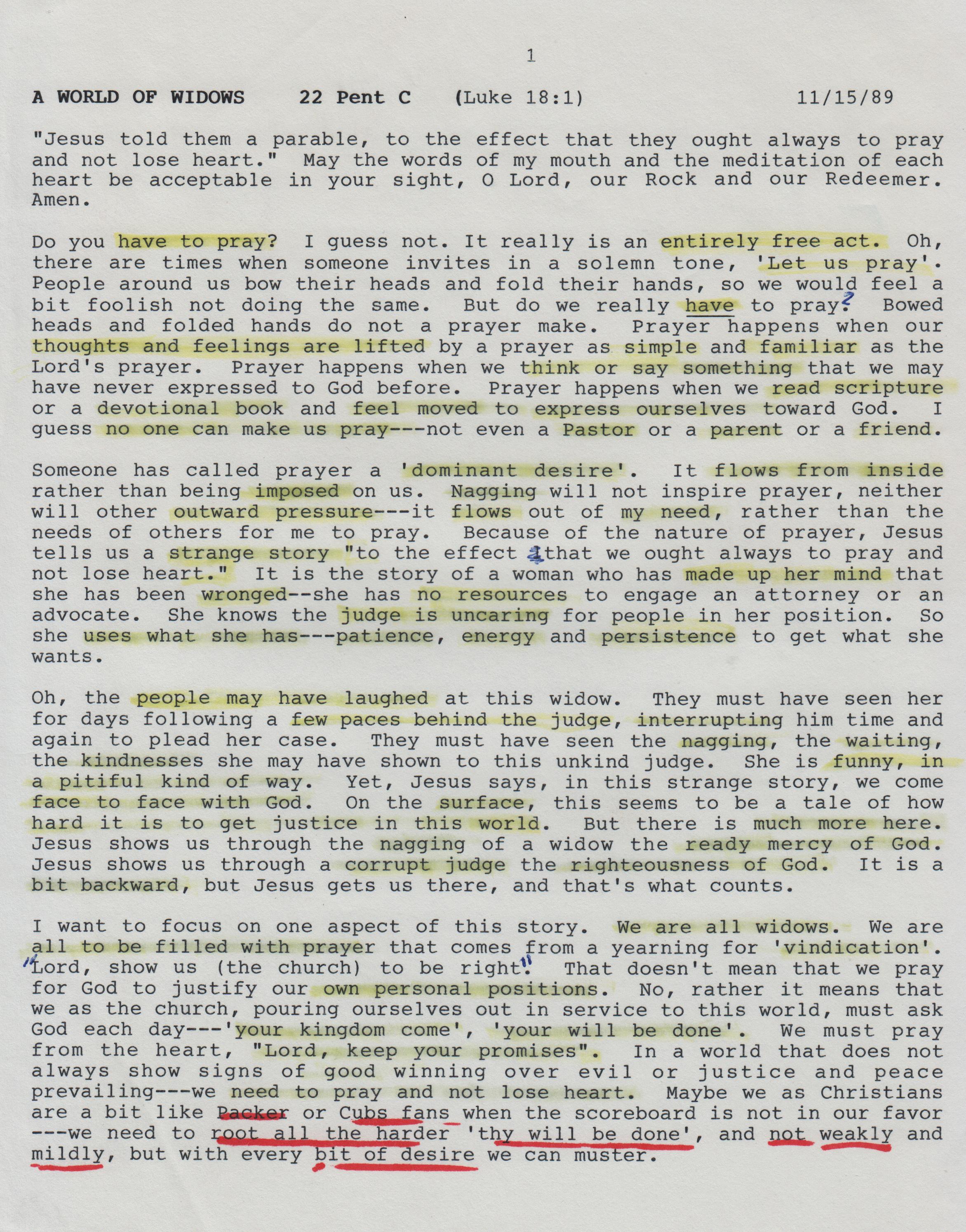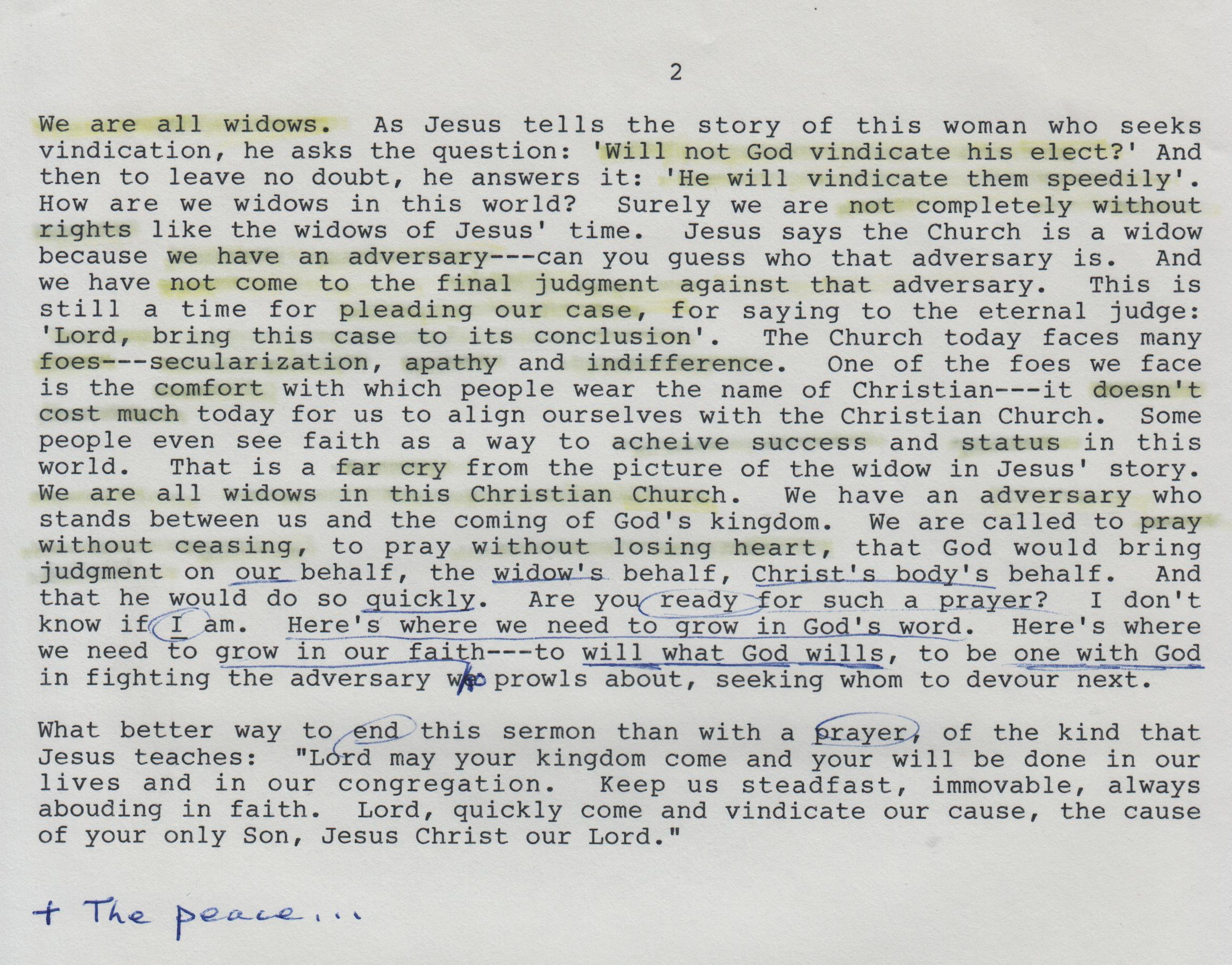This is a typed sermon with some highlighting and underlining in yellow and red, as well as some corrections in blue pen. It is a sermon from 22 Pentecost and was preached in November of 1989. Technically, Luke 18 is now a part of 19 Pent C in the RCL.
This sermon refers to the persistance of Chicago Cubs and Green Bay Packers fans while their teams are losing, and it should be noted that both of those teams have won championships since this sermon was preached.
A WORLD OF WIDOWS: - 22 Pent C - 11/15/1989 - Luke 18:1


Here is the text of the sermon, obtained via OCR from Google Docs
A WORLD OF WIDOWS 22 Pent C (Luke 18:1) 11/15/89
“Jesus told them a parable, to the effect that they ought always to pray and not lose heart.” May the words of my mouth and the meditation of each heart be acceptable in your sight, O Lord, our Rock and our Redeemer. Amen.
Do you have to pray? I guess not. It really is an entirely free act. Oh, there are times when someone invites in a solemn tone, ‘Let us pray’. People around us bow their heads and fold their hands, so we would feel a bit foolish not doing the same. But do we really have to pray? Bowed heads and folded hands do not a prayer make. Prayer happens when our thoughts and feelings are lifted by a prayer as simple and familiar as the Lord’s prayer. Prayer happens when we think or say something that we may have never expressed to God before. Prayer happens when we read scripture or a devotional book and feel moved to express ourselves toward God. I guess no one can make us pray—not even a Pastor or a parent or a friend.
Someone has called prayer a ‘dominant desire’. It flows from inside rather than being imposed on us. Nagging will not inspire prayer, neither will other outward pressure—it flows out of my need, rather than the needs of others for me to pray. Because of the nature of prayer, Jesus tells us a strange story “to the effect that we ought always to pray and not lose heart.” It is the story of a woman who has made up her mind that she has been wronged–she has no resources to engage an attorney or an advocate. She knows the judge is uncaring for people in her position. So she uses what she has—patience, energy and persistence to get what she wants.
Oh, the people may have laughed at this widow. They must have seen her for days following a few paces behind the judge, interrupting him time and again to plead her case. They must have seen the nagging, the waiting, the kindnesses she may have shown to this unkind judge. She is funny, in a pitiful kind of way. Yet, Jesus says, in this strange story, we come face to face with God. On the surface, this seems to be a tale of how hard it is to get justice in this world. But there is much more here. Jesus shows us through the nagging of a widow the ready mercy of God. Jesus shows us through a corrupt judge the righteousness of God. It is a bit backward, but Jesus gets us there, and that’s what counts.
I want to focus on one aspect of this story. We are all widows. We are all to be filled with prayer that comes from a yearning for ‘vindication’. ‘‘Lord, show us (the church) to be right? That doesn’t mean that we pray for God to justify our own personal positions. No, rather it means that we as the church, pouring ourselves out in service to this world, must ask God each day—‘your kingdom come’, ‘your will be done’. We must pray from the heart, “Lord, keep your promises”. In a world that does not always show signs of good winning over evil or justice and peace prevailing—We need to pray and not lose heart. Maybe we as Christians are a bit like Racker or Cubs fans when the scoreboard is not in our favor —We need to root all the harder ’thy will be done’, and not weakly and mildly, but with every bit of desire we can muster.
We are all widows. As Jesus tells the story of this woman who seeks vindication, he asks the question: ‘Will not God vindicate his elect?’ And then to leave no doubt, he answers it: ‘He will vindicate them speedily’. How are we widows in this world? Surely we are not completely without rights like the widows of Jesus’ time. Jesus says the Church is a widow because we have an adversary—can you guess who that adversary is. And we have not come to the final judgment against that adversary. This is still a time for pleading our case, for saying to the eternal judge: ‘Lord, bring this case to its conclusion’. The Church today faces many foes—secularization, apathy and indifference. One of the foes we face is the comfort with which people wear the name of Christian—it doesn’t cost much today for us to align ourselves with the Christian Church. Some people even see faith as a way to achieve success and status in this world. That is a far cry from the picture of the widow in Jesus’ story. We are all widows in this Christian Church. We have an adversary who stands between us and the coming of God’s kingdom. We are called to pray without ceasing, to pray without losing heart, that God would bring judgment on our behalf, the widow’s behalf, Christ’s body’s behalf. And that he would do so quickly. Are you ready for such a prayer? I don’t know if(I am. Here’s where we need to grow in God’s word. Here’s where we need to grow in our faith—to will what God wills, to be one with God in fighting the adversary who prowls about, seeking whom to devour next.
What better way to end this sermon than with a prayer, of the kind that Jesus teaches: “Lord may your kingdom come and your will be done in our lives and in our congregation. Keep us steadfast, immovable, always abounding in faith. Lord, quickly come and vindicate our cause, the cause of your only Son, Jesus Christ our Lord.”
+The peace…